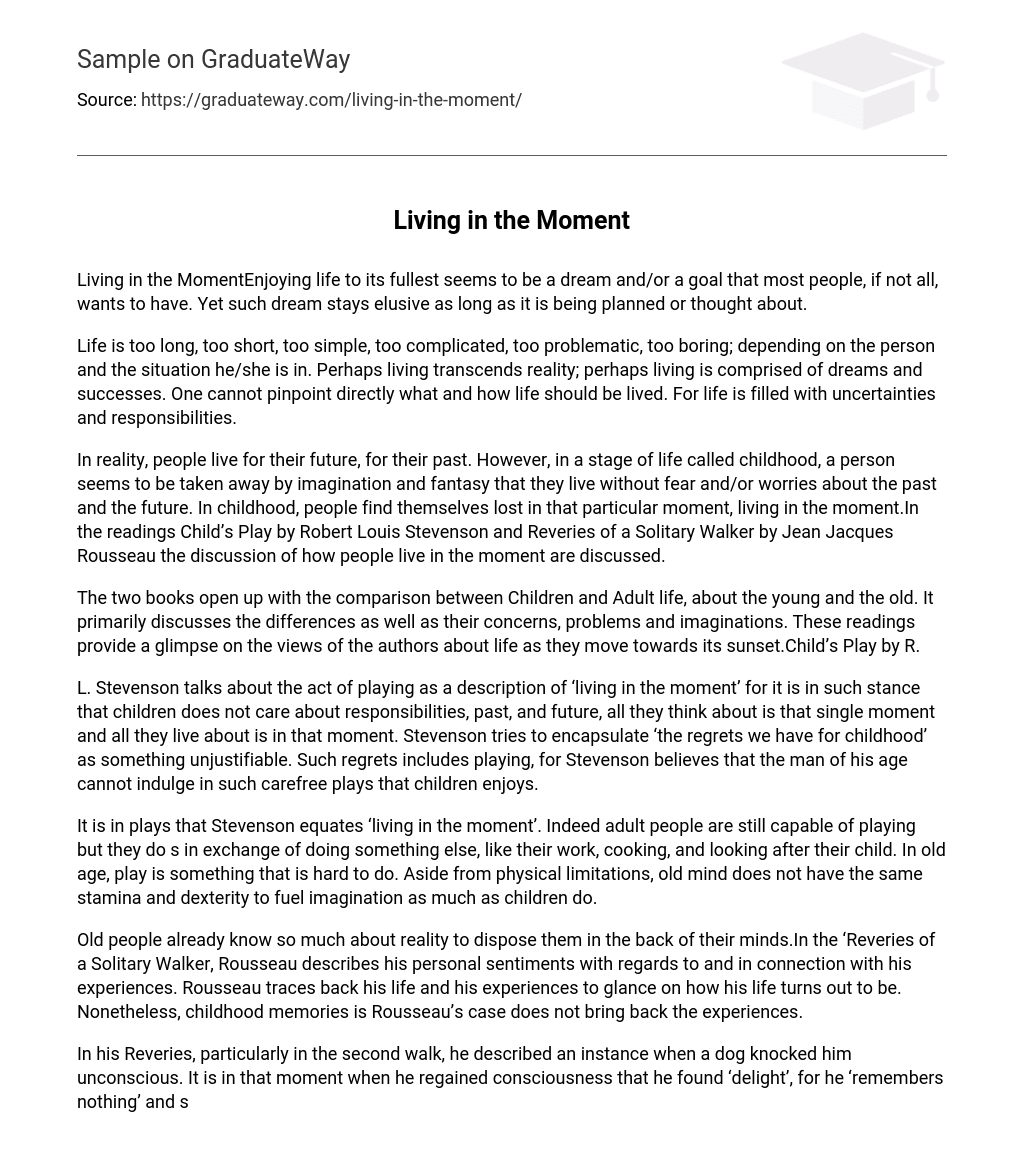Living in the MomentEnjoying life to its fullest seems to be a dream and/or a goal that most people, if not all, wants to have. Yet such dream stays elusive as long as it is being planned or thought about.
Life is too long, too short, too simple, too complicated, too problematic, too boring; depending on the person and the situation he/she is in. Perhaps living transcends reality; perhaps living is comprised of dreams and successes. One cannot pinpoint directly what and how life should be lived. For life is filled with uncertainties and responsibilities.
In reality, people live for their future, for their past. However, in a stage of life called childhood, a person seems to be taken away by imagination and fantasy that they live without fear and/or worries about the past and the future. In childhood, people find themselves lost in that particular moment, living in the moment.In the readings Child’s Play by Robert Louis Stevenson and Reveries of a Solitary Walker by Jean Jacques Rousseau the discussion of how people live in the moment are discussed.
The two books open up with the comparison between Children and Adult life, about the young and the old. It primarily discusses the differences as well as their concerns, problems and imaginations. These readings provide a glimpse on the views of the authors about life as they move towards its sunset.Child’s Play by R.
L. Stevenson talks about the act of playing as a description of ‘living in the moment’ for it is in such stance that children does not care about responsibilities, past, and future, all they think about is that single moment and all they live about is in that moment. Stevenson tries to encapsulate ‘the regrets we have for childhood’ as something unjustifiable. Such regrets includes playing, for Stevenson believes that the man of his age cannot indulge in such carefree plays that children enjoys.
It is in plays that Stevenson equates ‘living in the moment’. Indeed adult people are still capable of playing but they do s in exchange of doing something else, like their work, cooking, and looking after their child. In old age, play is something that is hard to do. Aside from physical limitations, old mind does not have the same stamina and dexterity to fuel imagination as much as children do.
Old people already know so much about reality to dispose them in the back of their minds.In the ‘Reveries of a Solitary Walker, Rousseau describes his personal sentiments with regards to and in connection with his experiences. Rousseau traces back his life and his experiences to glance on how his life turns out to be. Nonetheless, childhood memories is Rousseau’s case does not bring back the experiences.
In his Reveries, particularly in the second walk, he described an instance when a dog knocked him unconscious. It is in that moment when he regained consciousness that he found ‘delight’, for he ‘remembers nothing’ and such feeling is somehow equivalent to a person being born. Regaining his consciousness, he remembers ‘neither his identity nor his sensations’. He describes the feeling as ‘calmness’ which he can ‘compare nothing with in all the pleasures that stirs up our lives’.
This experience is almost the same experience that one posse during childhood. An experience that does not include worries, pain even identity. There is nothing to think about, free of responsibilities, free from pain.In view of this, I believe that it is really important for people to live in the moment.
‘Living in the moment’ in my opinion means that the person is totally engulf by that certain experience. It is a moment in which the person does not care about anything else aside from experiencing the moment. It is living in the present without any connection to the past or the future. It is about creating memories without reason without motives and with no known purpose.
To live in the moment makes people show their genuine emotions, thoughts and actions. To express fear and resentment or regrets creates an incomplete attention to the moment that takes the person away from the actual experience into a realm of worries and agony. Such ‘living in the moment’ incidents as described by both Stevenson and Rousseau are instances that people recalls. However anyone can in live in the moment even he/she is not a child or he/she does not loss consciousness and memory.
Everyday one can live as if he/she is not doing it for a past or a future. Trivialities in life makes living in the moment happen. For instance when one is doing work, perhaps typing; if he/she would not think about worries and will be completely absorbed by what he is doing and enjoying every second of it, he/she is living in the moment of typing.To live in the moment is to be able to capture the moment in its entirety.
This is something that cannot be done when someone is worrying, for example about a debt that he/she needs to pay next week. The person is living for next week and what will happen next week. The same with living in the past, if one cannot accept a fact that happened in the past and is continuously mourning or crying over what had happened then that person is living for his past. This attitude makes one forget about the current state or the present.
It takes away every minute of his life; it includes the time he/she spent in worrying or regretting over something that is uncertain or cannot be amended. Work Cited:Kass, L. Being Human Core Readings in the Humanities. University of Chicago.2004.





